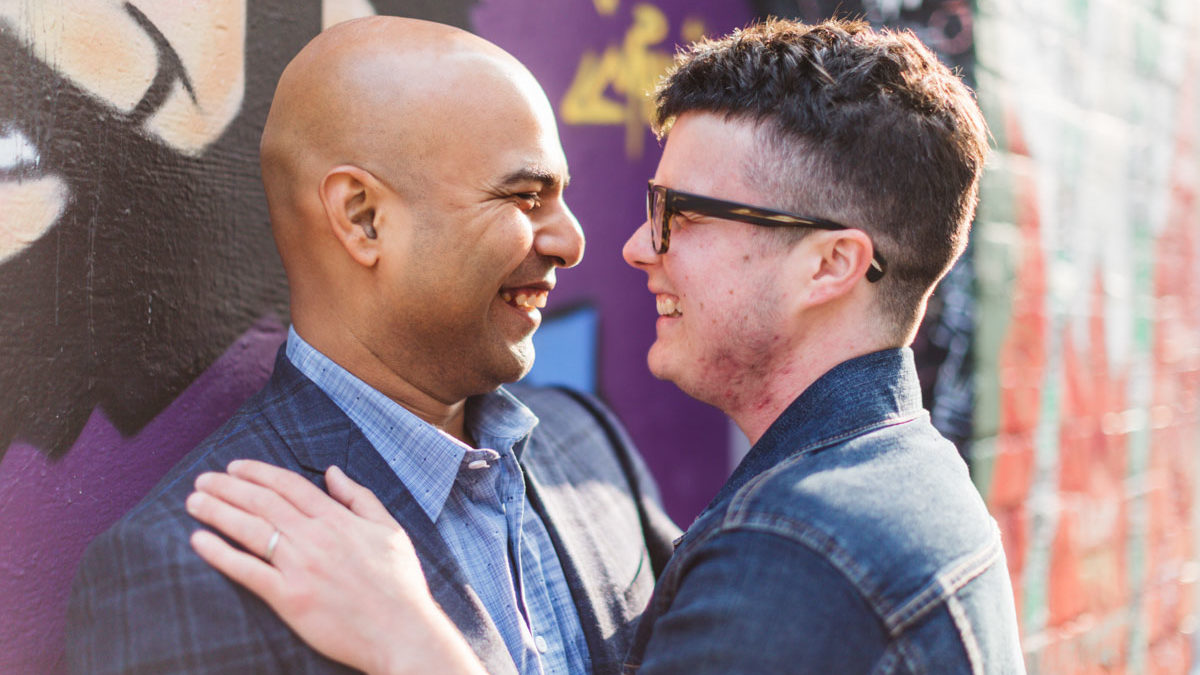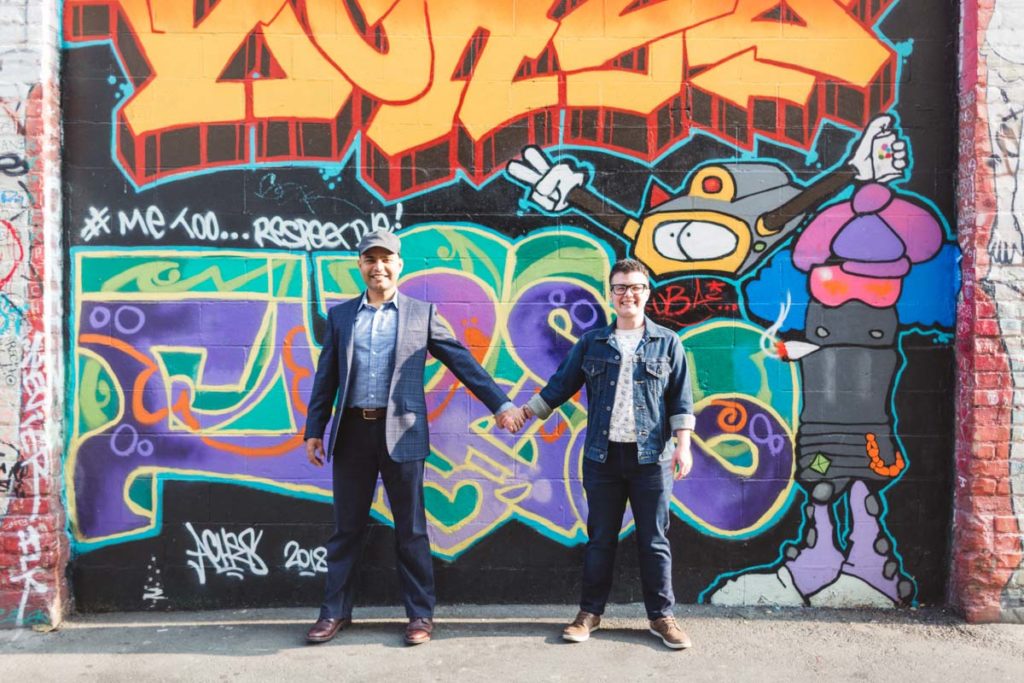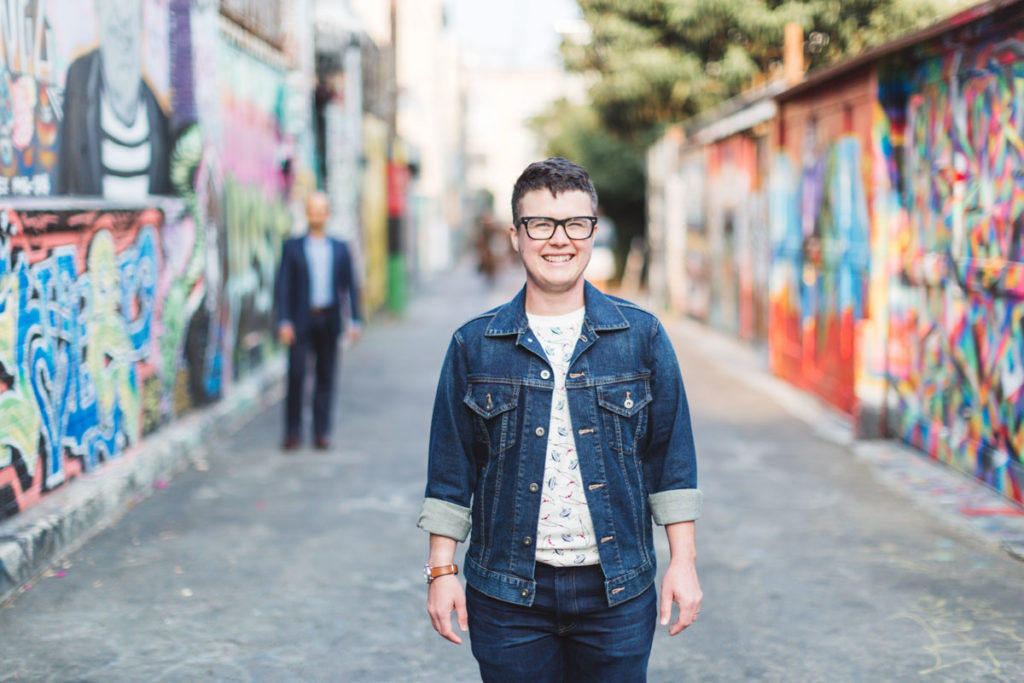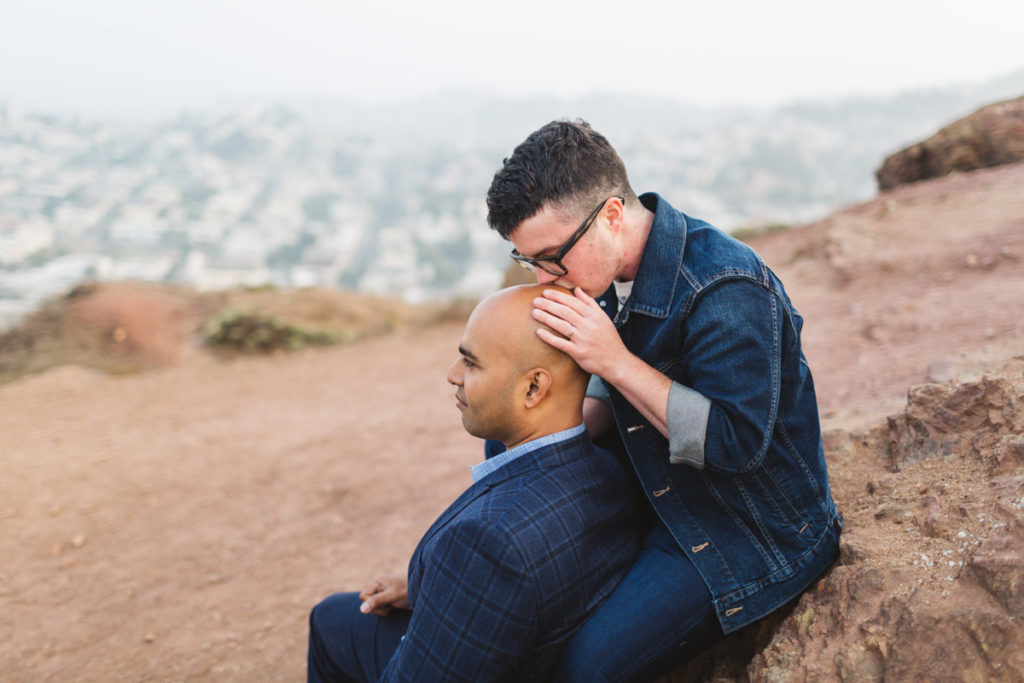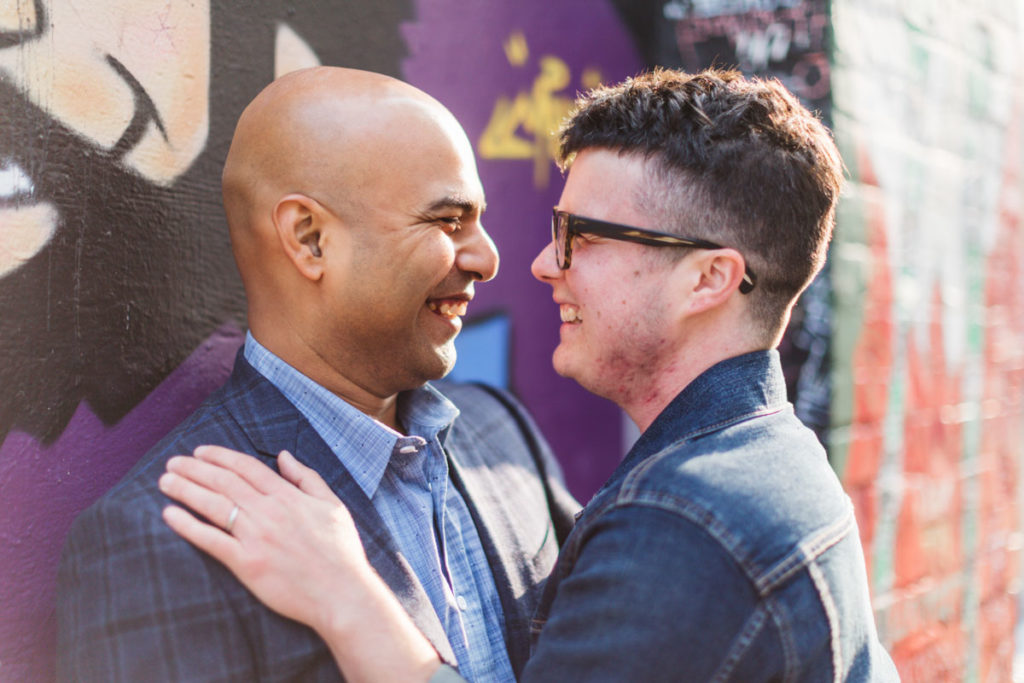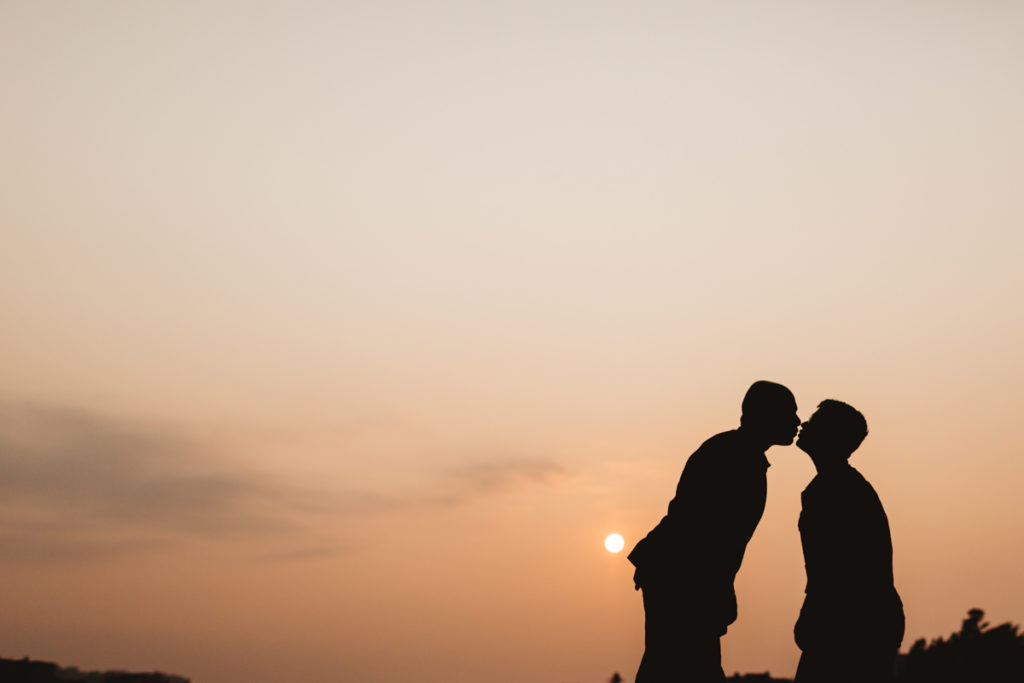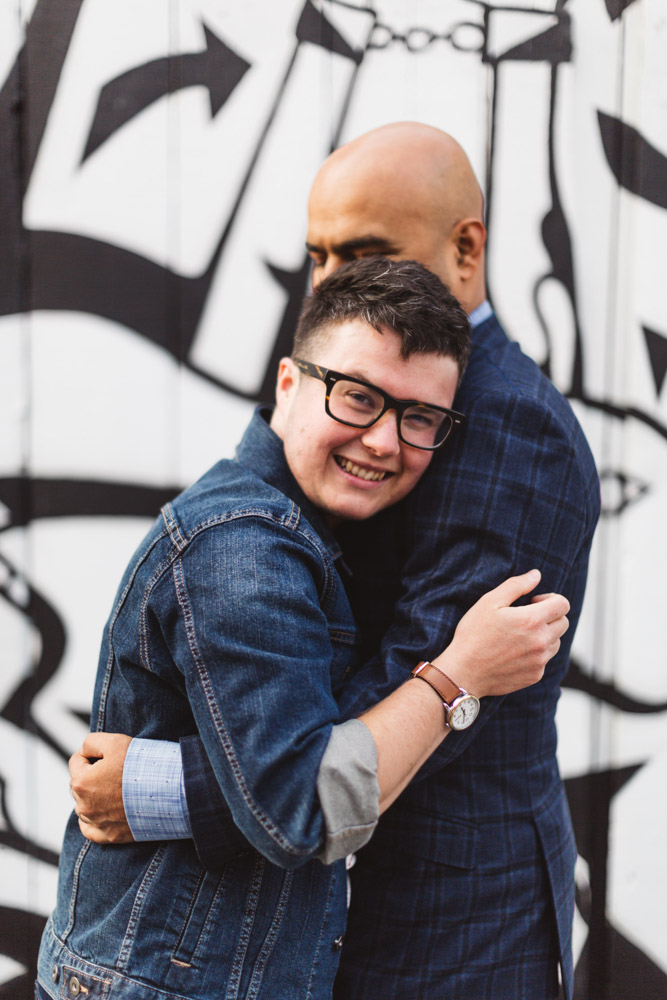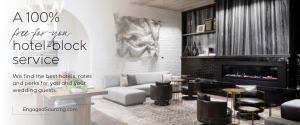Andy and Raj are a San Francisco couple in an open marriage and part of a thriving poly community. Andy is a bisexual trans man, and his husband Raj is straight, cis and male. They love each other deeply, have sex with other people, attend play parties, and manage to make it all work. They opened up to us in a candid conversation to chat about surgery, sex-positive communities, jealousy and supporting each other.
Equally Wed: Tell us about your gender identity and sexual orientation journeys.
Raj: I identify as straight, cis and male. I have experimented to see if I have any queer orientation and have been part of sexually open communities long enough that if there was something else to it, I would have discovered it by now!
Andy: I’m a trans man and I’m bi. I have known that I was bi—attracted to both boys and girls—for as long as I can remember, at least since first grade. Then I remember finding out about genderqueer people, and finding I was attracted to them too. I use the word bi because that’s the word I used when I first came out, and I think of it as being attracted to my own gender as well as genders that are not my own.
Tell us a little about Andy’s transition journey and how that impacted your relationship.
Andy: I grew up in Houston, walking distance from NASA’s mission control, where the only thing that mattered was that you could grow up to be a rocket scientist. That means it didn’t matter who you dated—as long as they were smart, as long as they could grow up to work at NASA. To my parents’ credit, I was taught that girls could be anything. “You want to be a race car driver? Here are awesome female race car drivers! You want to be a physicist? Here are all these strong women in physics.” It just never occurred to me that I was a boy, because there wasn’t anything boys could do that I couldn’t do.
So I went to college, went to graduate school, and then moved to San Francisco in 2014 for work. And that’s where the gender journey really started.
As soon as I landed in San Francisco, I started getting to know lots of queer, sex-positive communities. Pretty early on, I had a friend and lover who went through top surgery. After recovery, I saw them in a T-shirt without a bra, and found myself incredibly jealous. That sparked a year of questioning and experimenting: Why am I jealous? What do I really want here: the feeling of a T-shirt against my skin, or a flat chest, too? At the time, I had a 34F bra size, and spent a year going without a bra, to see how that felt. I just got catcalled a lot. I kept noticing all these guys on the street in T-shirts and jeans, and thought, “If I’m wearing the same shirt, why don’t I look like that?” I needed top surgery.
Fast-forward several months, and I saw Jiz Lee reading from their book Coming Out Like a Porn Star at Writers With Drinks. If you don’t know them, they’re a porn star, model and author, and they write really smart things about gender. As soon as they began speaking, I realized, “I don’t want my voice to sound that high.” Then I realized that to have a deeper voice I needed to take testosterone. I hadn’t been planning on that, but it was such a visceral reaction.
Around the same time, I spent a weekend with another friend and lover. On Sunday morning, out of the blue, he started referring to me as he and using male terms to describe my body. I cried. A lot. I felt so seen and loved and cared for. He saw me as a man before I did—he put words to what I didn’t know how to say.
There wasn’t a single moment where I realized I was trans. As Jamison Green writes in Becoming a Visible Man, transitioning is like lighting candles in the dark—you light one candle, and see where you are. Then you light another, and another. You thought that you were in this tiny hallway and then it turns out to be a huge, beautiful room, bigger and wider and more gorgeous than you thought possible.
Throughout this journey, I was seeing a gender therapist and talking to Raj about it. I was terrified. Raj is a straight guy, even though he’s been in queer communities since we met in 2008. This was 2014—we had been married for four years and together for six. I couldn’t imagine being married to anybody else. He’s my best friend, lover, teammate, person I want to grow old with and travel the world with. If I’d had to choose between transition and marriage, I would have chosen my marriage.
If I’d had to choose between transition and marriage, I would have chosen my marriage.—Andy
In late 2016, we took a trip to Morocco and Spain. In Marrakech, I got a notebook engraved with the name I’d chosen for myself—Andrew Miles. I had decided to come out to all my friends, family and coworkers. Then, back in Sevilla, we stayed up all night watching the presidential election unfold with increasing horror. I was devastated. I thought I wouldn’t be able to have access to testosterone or surgery, or there’d be more hate crimes so it wouldn’t be safe for me to transition anymore. So we came home and didn’t do anything immediately, waiting to see what would happen.
What was Raj’s involvement with Andy’s transition, and how did he encourage Andy to take that step?
Raj: When Andy decided to transition, it wasn’t really a surprise to me, given the non-binary gender journey he’d already been on, and his attitude to certain things like clothes and his body. I listened to him complain for 10 years that he hates his breasts, so getting rid of them seemed like the next logical step.
As a straight guy, honestly, I had hoped it would stop at being non-binary and not go to the transition stage. There were a couple of reasons. One, given that I’m straight, I just assumed that I should be married to a woman. Second, when we were on a flight to Morocco, it occured to me that we’d be perceived on future journeys as a gay male couple. That’s an experience I wasn’t really ready for—at least being perceived as an identity that I’m not.
However, Andy was getting very miserable. I wasn’t sure I wanted to be married to somebody that miserable for the rest of my life! Eventually, I suggested that he try this for a few months. Testosterone has some irreversible effects, but at least it’s not surgery. My therapist also recommended that we go slow.
Andy: Raj came out one day and said, “I think you should take testosterone!” I asked if he was sure, and he said, “Look, we’ve talked about this as much as we possibly can. The only way we’ll know if it works is by trying it.” So I said, “OK, I made a doctor’s appointment, but I don’t have to go.” Raj said, “It’s OK, really, go!” Then I went to the appointment and said, “OK, I got a prescription, but I don’t have to fill it!” And he said, “It’s OK, fill it.” Then I came home with my testosterone and said, “OK, I filled the prescription, but I don’t have to use it!”
Then one morning he came to me with my testosterone in one hand and chai in the other hand and said, “Honey, I brought you your T.” I have the most amazing husband in the world. That was February 22, 2017.
Honey, I brought you your T.
We decided I would use topical testosterone. It’s an alcohol-based gel that smells like hand sanitizer. I put it on my shoulders every morning. We did that for two reasons. One, I hate needles. Two, it’s a smaller dose, and it’s more gradual and consistent. You don’t have these huge mood swings, or if you decide to stop, it leaves your system faster. Your voice changes a lot more slowly.
I checked in with Raj after about three months. He said, “Well, you seem a lot happier, and we don’t fight about the thermostat anymore!” I used to be cold all the time, but after T, I run warmer.
Then I had top surgery in July 2017, five months to the day after starting T.
How did you come to the arrangement of being in an open marriage?
Andy: We started dating in February 2008. A few years in, I really missed sleeping with women, so I asked if there was a way that I could still do that. Around the time we got married, Raj introduced me to a friend of his.
Raj: She was a close friend of mine from grad school. I knew that she had been in a relationship with a couple before. Andy and I lived in Atlanta. This friend lived in Houston. I told her about it and she was interested. She came over and everything worked out really well. She was our girlfriend for about a year and ended up visiting us about once a month.
She ended up deciding to date someone exclusively, which was always in the cards from the start, so it was an amicable split. But the experience was encouraging even though it was 2010, it was Atlanta, and we were doing it on the downlow as many people do. Then after it ended, Andy met someone at grad school when he was a student at Georgia Tech.
Andy: I fell in love with another woman at school, which was really challenging because she was a lesbian, so she couldn’t date both of us. That was the only relationship model that we knew at the time.
Raj: That was challenging for both of us, partly because we were trying to figure this out on our own. Andy and the lesbian woman dated for a couple of years and we were good friends, but it caused a bit of a strain on the relationship because we had this notion that things needed to be equal and fair. I had no idea how to find someone of my own. We had no community.
Andy: We read all of the books we could find on open relationships, and they weren’t very helpful. We tried a poly-friendly therapist and that wasn’t very helpful. We came out to our friends in Atlanta as poly and we ended up losing about half of them.
Raj: Once Andy and this woman broke up after a couple of years, we realized that Atlanta wasn’t going to be a long-term place for us. We discovered some poly communities there after we left, but those communities are pretty quiet about it. We also decided we want to move out and explore some other city—someplace more bike friendly with better transit. As Andy finished his PhD he ended up getting a job in San Francisco.
Andy: A friend introduced me to someone who hosts a lot of sex-positive events and has a really strong network of sex educators and sex therapists, so through that community I met a lot of wonderful people who became our good friends. Then we began exploring all that San Francisco has to offer.
Raj: Remember, we were very early in our experiences. We hadn’t learned to explore any of this. Andy had gone ahead of me to San Francisco while I was in Atlanta hearing all of this on the phone. I was freaking out! Every time we spoke on the phone he would be telling me about the new people he had sex with and the play parties he’d been to. It was disorienting for me and caused a lot of conflict. About eight months later I moved to San Francisco. I didn’t feel like I was comfortable in those spaces that Andy was in. I ended up freaking out at the play parties. It was hard. Those were the times we thought about separating.
When queer people come out, they don’t have a playbook.—Raj
Over time I began exploring that a little more seriously. I started seeing a relationship coach. I realized that as a straight guy in a patriarchal society, I have never had to question what I want in a relationship. If you follow traditional gender roles, which we had been doing, you’re given a part by society. When queer people come out, they don’t have a playbook. They are forced to figure out what their needs, desires, preferences and boundaries are. They have to find out what the menu of options is. Straight people, guys in particular, don’t have to do that.
When the question came up with my coach of, “What kind of relationship do you want?,” I didn’t even know that there was something to create. I thought relationships were just one thing. By nature I’m curious so I began exploring that process. I began to figure out what kind of relationship I wanted in the first place!
All of that was a two-year journey for me, to get to a point where Andy already was. Finally, I began to see that our relationship doesn’t have to be predefined in a certain way. We can create our own.
How do you deal with feelings of jealousy, especially now that you’re not seeing the same person together?
Raj: Initially we dealt with it really badly. During Andy’s two-year relationship with the lesbian woman in Atlanta, I felt so much jealousy and insecurity. One of the things you read about in open marriage books is the true nature of jealousy. We see it as this destructive, deal-breaking emotion, but usually it’s just an indicator of something else that’s being triggered. You can stop at your jealousy or you can reflect on what it is that’s at the root of the jealousy. It’s hard, but that helps mitigate the effects of the jealousy. One of our friends within the community says, “Jealousy is often the end of a conversation whereas it should be the beginning.”
Usually when couples open up their marriage, in a bid to reduce the jealousy, they set up all kinds of rules. We did that too. A common one is you can have sex with others but you can’t fall in love. Or there are silly ones like one that Andy made up with the first person we dated, that I could kiss her on the lips but not on the forehead. That was a gesture of intimacy that was reserved only for Andy.
Andy: Raj had a rule in the beginning that I could sleep with other women but not other men.
Raj: This is a very common one, but also reflected my insecurity. It’s known in the poly community as a one-penis policy, or OPP. Once you start investigating with a therapist where the insecurity comes from, the need for those rules goes away.
Andy: Jealousy can be really helpful, though. I realized that I needed to have top surgery because I saw someone else’s flat chest and I was jealous. Jealousy is useful information.
Raj: Now, we have tools to deal with jealousy. It’s never going to go away but we’re equipped.
Andy: One of the things I appreciate most about having an open marriage and each of us having multiple partners is the greater social support that we have during hard times. When Raj’s father passed away in March, it was a really hard time. The day that we got the phone call, my girlfriend was over, she was spending the night. She woke up and she held us both and drove us to the airport, and she kept me company while Raj was in India and I couldn’t go because I didn’t have the visa set up after my name change. It’s amazing to have that close of a relationship. Of course, some people get that through friendships.
Raj: One reason it works for us is because we’ve put in the work to navigate our relationship. When I tell people I’m straight, a lot of people ask me questions like “Why are you married to a man?”, or “How do you have sex?” Like a lot of long term couples, Andy and I weren’t really having a lot of sex before he transitioned. As a straight man, I’m not attracted to him sexually. We want to stay married because our marriage is very, very strong in other ways. We’ve put in a lot of work to build this relationship.
The fact that we had already put a lot of work into our open marriage meant that Andy’s transition wasn’t really a big factor. We knew our sex life wouldn’t change that much, and we have other partners to meet our sexual needs, so why not keep what works? I see a lot of my friends getting divorced, and I can see how difficult it is to create a good marriage that lasts a long time where you have this level of communication and trust. We’ve managed to do this. It didn’t feel right to throw all that away over one thing like gender.
Andy: And now we want to have kids!
Interview and photos by Zoe Larkin



